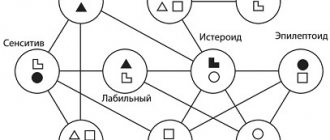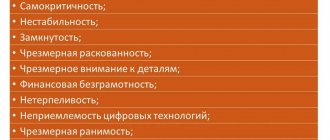A brilliant German scientist - Professor Karl Leonhard, a specialist in the field of psychiatry, neurology, psychology, studied schizophrenia, neuroses, affective psychoses, psychopathology and personality behavior. His work seriously influenced the development of science in Germany and throughout the world. He specialized in many areas related to psychiatry. His merit lies in the psychological and clinical study of deviations from the normal state and systematization of personality accentuations. The term became firmly established in the lexicon of professionals after the publication of the essay “Accented Personalities.”
The concept of accentuation
K. Leonhard's monograph, published in 1968, consists of 2 parts. In the 1st book, based on diagnostic studies, an analysis of personalities is given with a special emphasis on personality traits and non-standard reactions, which he designated as accentuations. In the 2nd part, he illustrates the theory using the example of the characteristics of literary characters from the works of world classics, using about 30 works by W. Shakespeare, O. Balzac, M. Cervantes, I. V. Goethe, L. N. Tolstoy and others.
This book was preceded by the 1964 monograph “Normal and Pathological Personalities.” Already in it the beginning of the classification of accentuations was laid. A prominent psychiatrist in his work identifies 10 impeccable types and several transitional ones. They all have different concentrations.
From the point of view of K. Leonhard, accentuation is not a pathology, a mental disorder, but only an extreme manifestation of the norm. This is disharmony in the development of character, expressed in the excessive manifestation of certain properties, causing heightened vulnerability of the individual in relation to certain influences and preventing its adaptation in extraordinary situations. In specific unfavorable circumstances, such sharpening can give rise to psychopathic pathology.
The manifestation of accentuation occurs only sporadically in isolated periods of personality formation. Most often this occurs in adolescents, and evens out as they grow older. Features of an accentuated character are not revealed under any conditions, but only in certain situations. Selective sensitivity of personality traits, manifested in relation to some reactions, often coexists with invulnerability to other influences. Accentuation differs from a personality disorder in that it does not simultaneously contain all the signs of pathology:
- Loss of the ability to adapt to social conditions (social maladjustment);
- Constancy over time;
- Impact on all areas of life.
Accentuations can be explicit or hidden (latent) - it depends on their level of expression. Explicit accentuations are noticeable regularly, hidden accentuations are observed only in extraordinary circumstances. The natural mental state can be gently replaced by accentuation, which under unfavorable circumstances can turn into psychopathy.
Leonhard established 12 types of accentuations, having different localizations in origin: 10 main and 2 auxiliary.
Accentuations of temperament
Temperament accentuations include 6 types.
Hyperthymic type
Such people are constantly in high spirits. They are enterprising, resourceful, active, ambitious, enjoy well-deserved authority in the team, and often occupy the position of leader. Decisiveness and quick wits allow them to burst with ideas and find innovative solutions. They are distinguished by:
- Optimism;
- Cheerfulness;
- Communication skills;
- Energy;
- Expansiveness;
- Cheerfulness.
Hyperteams are distinguished by their penchant for large, lively companies, in which they themselves often act as the instigators of funny tales, pranks and jokes. However, for important matters they do not always have enough thoroughness, diligence, attention, and concentration. When faced with opposition, they get angry. They are oppressed by loneliness, monotony and strict regulations; they do not like to obey, follow orders and follow rules.
Dysthymic type
Hypothymic personalities represent the opposition to the previous category. They are usually overly serious, focused on the gloomy and tragic aspects of life. Pessimism, despondency and anticipation of trouble restrain their initiative and energy. Distims are characterized by high moral principles. They differ:
- taciturnity;
- Lack of communication;
- Low self-esteem;
- Slow thinking;
- Increased sense of justice;
- Social passivity;
- Responsible attitude towards one's responsibilities;
- Closedness;
- Uncertainty.
Dysthymic individuals perform their work diligently and achieve stable results, unless agility, initiative, or risk are required. They usually take the blame for failures upon themselves. They prefer to communicate correctly with others, do not show emotions, and find a common language with managers. They can trust only a narrow circle of true friends, whose support, understanding and sympathy they need.
Affectively labile type
Representatives of the cyclothymic type of accentuation are characterized by repeated mood swings. Their behavior cannot be predicted in advance; it is paradoxical and inconsistent. A calm feeling of life alternates with a positive mood, mental activity, and then turns into melancholy, despondency, apathy, and indecision. The change in hyperthymic and dysthymic states does not always depend on external stimuli. As a result of repeated changes in mood, cyclothymic individuals are characterized by:
- Unstable performance;
- Fast fatiguability;
- Low creativity.
They are not intended for collective work; they prefer to work individually (preferably in free mode) and be responsible for the result of their work. In cycloids there is a parallel combination of both states with superiority of one type.
Affectively exalted type
Individuals with this type of accentuation are extremely sensitive to what is happening: successful deeds make them happy, and disappointing ones lead to a depressed mood, although depression is not typical for them. Emotions, explained by sensitive internal impulses, are always greatly exaggerated and clearly manifested externally. An exalted personality is characterized by:
- Increased communication skills;
- Talkativeness;
- Loving nature;
- Impressionability;
- Sincerity;
- Passion.
In conversation, they often use figurative expressive vocabulary, and a little louder than usual. They have a developed sense of beauty. They love nature, have exquisite taste, understand art, and often choose creative professions as their life's work - artist, designer. They have a sincere love for friends and loved ones, the ability to empathize and sympathize with people.
Anxious-fearful type
Individuals with fearful accentuation are characterized by indecisiveness, suspiciousness, and resignation. They often worry without any reason about potential failures in life, worry about their future and the fate of their loved ones, and doubt the correctness of their actions. Suspicious people tend to:
- Responsible attitude to business;
- Sense of justice;
- High moral qualities;
- Self-criticism;
- Goodwill;
- Punctuality.
They successfully avoid controversial situations and imprudent actions, perform their work well in a calm environment, and are prone to analytical and consulting activities, although they sometimes get lost when taking exams or during public speaking.
Emotive type
Such people are characterized by sublime strong feelings, responsiveness, good nature, and humanity. In terms of the intensity of their experiences, they have much in common with individuals of the exalted type, but unlike them, they are more hidden in the expression of their emotions. They are very sentimental, often cry and give the impression of fragility, tenderness, gullibility, and require a delicate attitude.
Thanks to responsibility and thoroughness, emotives are successful in professions that require understanding people. They depend on the opinions and assessments of others and are absolutely unable to protect their interests. Harshness causes them depression, prostration, and difficulties lead to confusion.
Character accentuations
Character accentuations according to K. Leonhard include 4 types.
Demonstrative type
Representatives of this type tend to make an impression, attract everyone's attention, and arouse increased interest. In any situation, they behave deliberately defiantly, they love to be in the center of events, often embellishing the share of their participation and influence. Such people tend to:
- Conceit;
- Ambition;
- Self-praise;
- Pretense;
- Artistry;
- The desire to lead.
They are most often educated, know how to be sociable, polite, inspire confidence in others, and captivate them with their ideas. They are excellent for performing representative functions, but are not capable of long-term effort or concentration, and when faced with problems, they leave their solution to others.
Pedantic type
The peculiarity of representatives of this type of accentuation is constancy, stability, increased pedantry, seriousness, thoroughness, and the desire to maintain order. They perform any work conscientiously and bring it to its logical conclusion. Their inherent scrupulousness and perseverance helps them become highly qualified financiers and accountants. They can work in the same team for many years.
Any deviation from order causes pedants to react painfully to this, but they do not enter into conflicts. They are rather slow to think, check and make responsible decisions. There are many demands placed on employees, which is why they are considered formalists.
Stuck type
Representatives of the affective-stagnant type of accentuation are characterized by intense emotional experiences. They never forget or forgive humiliation, so they are considered touchy and vindictive. They can fantasize for a long time and make plans for revenge. After a while, remembering the insult, they feel the same strong resentment as at the first moment. Their friends and enemies are clearly demarcated. This category is distinguished by:
- Tirelessness;
- Determination;
- Persistence;
- Integrity;
- Demandingness;
- Suspicion;
- Mistrust.
If successful, they show arrogance, arrogance, are uncompromising and unyielding in negotiations.
Excitable type
Representatives of this type of accentuation are unrestrained, hot-tempered, and impulsive. The demeanor and style of behavior are determined by an emotional outburst, a frenzy, uncontrollable by the mind. The priority for them is self-indulgence, getting pleasure, fulfilling desires. They never take into account the interests of others and take care of their health at the expense of intellectual development. Distinctive features: ambition, self-will, assertiveness, aggressiveness, lack of tolerance, rejection of criticism.
Classification of personality types
A person’s behavior depends on the education he received, what family he was brought up in, and what professional activity he leads. Two people with different character traits and behavioral reactions can become similar if they remain in the same life circumstances for a long time. Conversely, two people of similar nature may subsequently become completely different from each other.
The concept of accentuation involves the identification of pronounced personality traits that dominate the character and determine the behavior of the individual. Character traits that are overly expressed and suppress other traits often become the cause of the development of mental disorders. Studying the types of character accentuation according to Leonhard is advisable in the field of personnel selection.
An HR department employee familiar with the works of a German psychiatrist will, during an interview with an applicant for a vacant position, determine how well the person meets the requirements, how he will behave in the team, and what position he will take in relation to his superiors. Classification of character accentuations according to K. Leonhard involves the identification of types:
- Demonstrative. The dominant feature is the desire to attract attention and make an effect. Such people are selfish and do not think about the needs and needs of those around them. They crave recognition. To become the center of everyone's attention, they are ready for immoral, immoral acts. Such qualities as deceit, rich imagination, artistry, the ability to pretend, and a penchant for adventure help in achieving goals.
- Pedantic. A pronounced trait is excessive neatness. Such people strictly follow the points of the plan. If they have to make adjustments to the approved schedule or program of action, they become irritated and lose their peace of mind. They find it difficult to switch from one task to another.
- Stuck. The dominant feature is the prolonged experience of emotion and feeling. Such people are persistent and stubborn; it is difficult for them to switch from one type of activity to another. They have high self-esteem. They are distrustful and sensitive to manifestations of injustice.
- Excitable. Expressed traits are aggression, rudeness, irritability. Such people are domineering, demanding, and not ready to make concessions. It is not easy for them to get along with others due to lack of restraint, increased conflict and stubbornness.
Character determines the direction of an individual's interests and reactions to stimuli. Accented personalities, according to the theory of K. Leonhard, are formed under the influence of life circumstances and type of activity. Professions such as waiter, military man, businessman, teacher, and sales manager leave a noticeable imprint on behavior and demeanor. According to Leonhard, accentuated personalities are divided into groups - extroverts and introverts.
It is typical for an extrovert to demonstrate external activity, independent of mental activity. The actions of such people are often impulsive. The indecision and timidity of an introvert is associated with the dependence of actions on thought processes. Such people are characterized by intense mental activity, but rarely experience joy about making a decision. An extrovert focuses on specific facts, while an introvert develops his own opinion on each issue.
An extrovert's decision is usually less objective and realistic; an introvert's decision, based on deep analysis, weighing and long thought, is more sensible. The formed opinion of an introvert occupies an intermediate position between objective reality and his own “I”. Leonhard's typology provides for division by type of temperament. The influence of temperament reflects the speed and depth of emotional response. Psychotypes are distinguished in this group:
- Hyperthymic. Expressed traits: activity, energy, carelessness. Such people are multifaceted and optimistic. People of this type tend to experience failures painfully, they cannot stand strict disciplinary boundaries, and they do not take criticism well.
- Dysthymic. The dominant feature is a depressed, sad mood. Such people are overly serious and focused on expecting trouble. They have low self-esteem. They are slow and are not capable of great willpower - they give in where endurance and willpower are needed.
- Cyclothymic. The dominant symptom is the alternation of periods of depression and elevated, cheerful mood.
- Affectively exalted. The expressed trait is an extreme manifestation of emotions, both positive and negative. The exalted type comes into frantic, enthusiastic excitement at the slightest joyful occasion. At the same time, a minor nuisance can provoke an attack of deep despair. Such people are characterized by passion and polarity of feelings. They are able to experience love and hatred for one object for a short period of time.
- Anxious and fearful. A pronounced feature is increased anxiety and restlessness. Lives in constant fear of possible troubles in a state of constant internal tension. Doubts the correctness of his conclusions, thoughts, and actions.
- Emotive. Emotive accentuation presupposes the presence of subtle, sublime emotional reactions. Emotiveness is associated with responsiveness and humanity. Such people have extraordinary insight; usually their actions are not aimed at gaining leadership positions.
Leonhard developed a classification of types of character accentuations in order to identify mental abnormalities and disorders at an early stage. Accentuation implies disharmonious character formation, deviation from the norm - excessive emphasis on certain personality traits, which is associated with the individual’s vulnerability to certain adverse external influences.
It should be taken into account that vulnerability to one external influence can be combined with resistance to another. The presence of accentuation worsens social adaptation. Social maladaptation also manifests itself selectively. In clinical practice, Leonhard's concept is used along with the classification of accentuations by the Russian psychiatrist A. Lichko.
According to Leonhard, personality types are distinguished in accordance with the presence of a dominant trait in an individual. It should be borne in mind that the presence of a bright, prominent trait in the character is not a pathology, but indicates the likelihood of its development under the influence of provoking factors.
Personal level
Additionally, the typology distinguishes 2 types of personality accentuation – extroverted and introverted. Their interpretation by Leonhard does not coincide with the interpretation by other scientists (Eysenck).
Extroverts easily fall under the influence of others and change their minds. They easily adapt to changed circumstances, successfully communicate with new acquaintances, and effectively master new information.
Introverts tend to draw on their own experiences. They are so immersed in their inner world that they are detached from reality and are not influenced by life circumstances. They tend to reason and philosophize more than to act. This type of personality does not allow interference in their life and defends their own views and principles. K. Leonhard considers introverts to be more strong-willed individuals.
Types and types, main clinical manifestations
There are classifications of character accentuations, which were identified by A. E. Lichko and K. Leongard. The first proposed a typology of accentuations, consisting of 11 types, each of which is characterized by specific manifestations that can be observed in adolescence. In addition to types, Lichko identified types of accentuation, which differ depending on the degree of severity:
- obvious accentuation is an extreme version of the norm (character traits are expressed throughout life);
- hidden - the usual option (sharpened character traits appear in a person only in difficult life circumstances).
Types of accentuations according to A. E. Lichko:
| View | Manifestations |
| Hyperthymic | There is increased activity and mood. Such individuals cannot tolerate loneliness and monotony in life. They love communication and have a tendency to frequently change interests and hobbies. Rarely finish what they start |
| Cycloid | There are cyclical mood changes from hyperthymic to dysphoric (angry) |
| Emotionally labile | Unreasonable and frequent mood swings. People are highly sensitive. They openly express their positive emotions towards the people around them. Responsiveness, altruism and sociability are noted |
| Sensitive | Such individuals are characterized by a feeling of inferiority. There is increased impressionability. Interests lie in the intellectual and aesthetic spheres |
| Astheno-neurotic | There is increased moodiness and tearfulness. Such people quickly become tired and exhausted, and irritability often arises against this background. |
| Schizoid | Such people are characterized by isolation and like to spend time alone. It is common for teenagers to not communicate with their peers. They like to be around adults |
| Psychasthenic | Individuals with this character are prone to careful introspection and reflection. They take a long time to make a decision regarding any situation and are afraid of responsibility. Self-critical |
| Epileptoid | The behavior is characterized by attacks of anger towards other people. There is increased excitability and tension |
| Hysterical | They love to be the center of attention. Prone to demonstrative suicide and afraid of ridicule from others |
| Conformal | Dependent on other people. Submit to authority. They strive not to be different from others |
| Unstable | Craving for various interests and hobbies. Such people are lazy. They have no plans for their future |
Leonhard identified a classification of character accentuations, consisting of 12 types. Some of them coincide with the typology of A.E. Lichko. He studied the typology of characters in adults. The species are divided into three groups:
- 1.temperament (hyperthymic, dysthymic, exalted, anxious and emotive);
- 2.character (demonstrative, stuck and excitable);
- 3.personal level (extroverted and introverted).
Types of accentuations according to K. Leonhard:
| View | Characteristic signs |
| Hyperthymic | Readiness to make contact at any time. There is a clear expression of facial expressions and gestures when communicating. Energetic and proactive. In some cases, there is conflict, irritability and frivolity |
| Dysthymic | Lack of sociability. Pessimistic and melancholic mood and outlook on the future |
| Cycloid | Frequent and sudden mood changes. Behavior and manner of communication with people around you depends on your mood. |
| Excitable | Slow verbal and nonverbal reactions to the situation. If a person is emotionally excited, then irritability and aggression are noted |
| Stuck | There is boredom. They tend to be preachy and touchy. In some cases, such people are capable of taking revenge |
| Pedantic | They are passive in conflicts. Conscientiousness and accuracy in carrying out tasks are noted. There is a tendency towards tediousness |
| Anxious | Anxious states arise with or without cause. Such individuals lack self-confidence |
| Emotive | They feel comfortable only around close people. The ability to empathize and sincerely rejoice at someone else's happiness is noted. There is increased sensitivity |
| Demonstrative | Such individuals strive to take a leadership position. They are artistic. There is unconventional thinking, selfishness, hypocrisy and a tendency to boast |
| Exalted | They love to communicate and are altruists. There is a tendency to commit impulsive actions |
| Extroverted | Personalities of this type are willing to make contact with people and have a large number of friends. They are non-conflicting and easily succumb to the influence of others. Sometimes there is rash actions and a tendency to spread gossip. |
| Introverted | There is isolation, a tendency to fantasize and loneliness |







